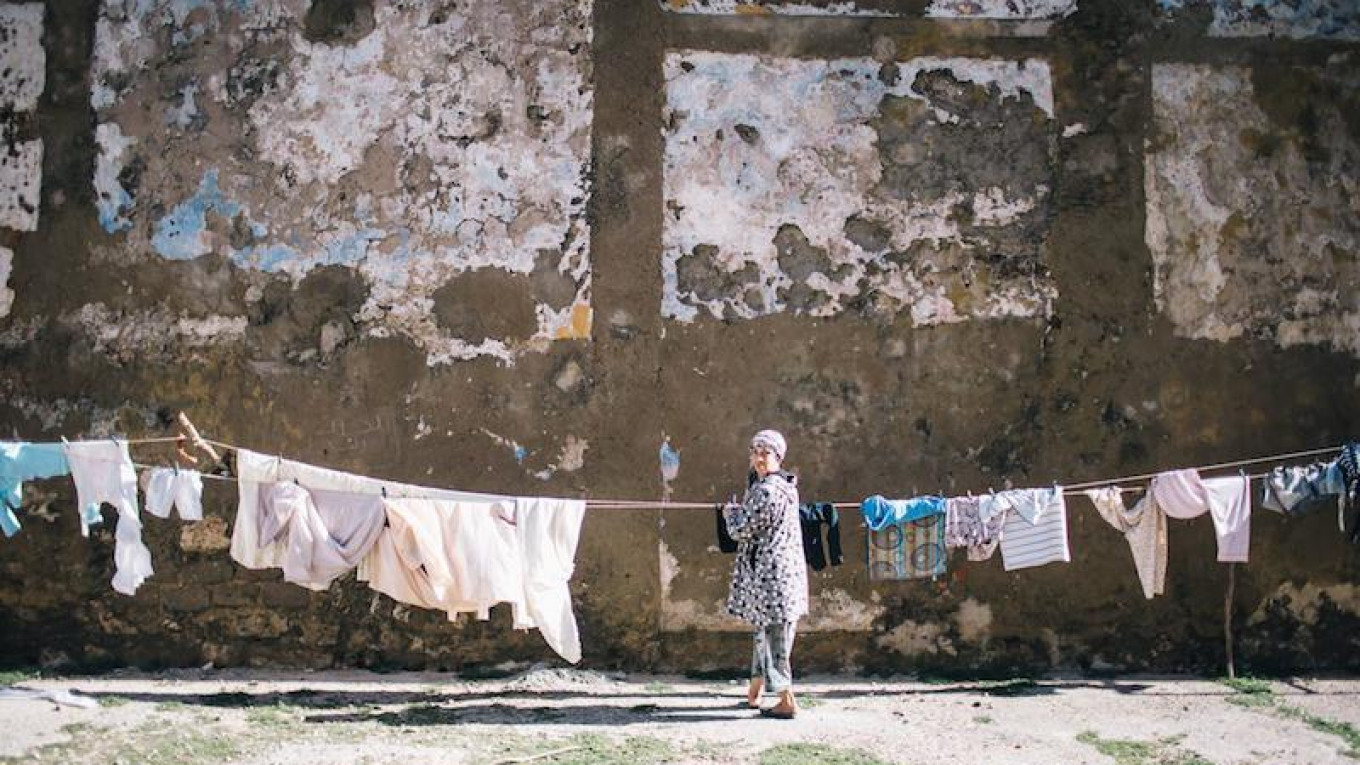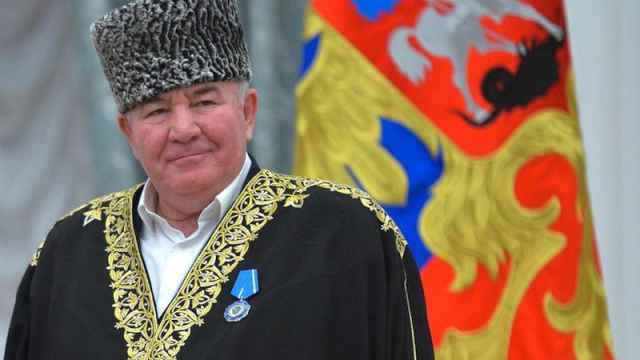The stories these women tell send shivers down the spine.
They were only children when their mothers took them to see the older women. These women cut off part of their clitoris, sometimes all of it, sometimes together with the labia, using a regular knife or scissors. There were no sterilized instruments, nor anesthesia; instead, there was pain, blood, the risk of infection and severe psychological trauma.
Without the procedure, their relatives said they wouldn't be proper Muslims. Everyone in the community does it, and you also need it to become a decent woman that a man will marry. It will protect you from fornicating, both before and after marriage, and will stop you from living in sin if you never marry by killing “woman's frenzy,” otherwise known as sexual desire.
Female genital mutilation (FGM), a dangerous ritual aimed at diminishing women’s sexuality, is traditionally associated with African countries. But the practice also exists in Russia.
On Aug. 15,
the Moscow-based nongovernmental organization Russian
Justice Initiative (RJI)
released a report revealing that FGM is a common practice in
several remote mountain villages in Dagestan, one of the Russia's
troubled North Caucasus republics. Several years in the making, the
report is the first research conducted on female genital mutilation
(FGM) in Russia. Its findings are shocking: The document suggests
that tens of thousands of women residing in these villages may have
undergone the procedure.
Russia has never been on the radar of the UN organizations that fight to
eradicate FGM, says Luis Mora, a UNFPA expert on gender and human
rights. “It has never been considered one of the countries where FGM
could be practiced. Recent findings on Dagestan are completely new for
us,” he says.
The RJI report has sparked a wide range of reactions across Russian society.
Ismail Berdyiev, a mufti in the neighboring Karachaevo-Cherkessia region, told journalists that FGM is necessary to “suppress women's energy,” and that it “would be good if all women were cut, so that there would be no fornication on Earth.” Maria Baronova, an opposition politician running for a seat in the State Duma, picketed a mosque in Moscow with a sign that read: “Slaughter sheep, not women.”
Diana Gurtskaya, a singer and member of the Civic Chamber, filed a request to the Prosecutor General's Office to launch a probe into the practice. But presidential human rights council member Maxim Shevchenko called the RJI report “a deeply inappropriate hoax” perpetrated by liberal political forces in order to destabilize the situation in Dagestan.
Outraged by the report, Russian officials, both publicly and in conversations with human rights activists, acknowledged the problem and promised to deal with it. But, several days later, the dust has begun to settle and other issues are replacing FGM on the country's agenda. Activists are optimistic, but expect little immediate effect.
Ethnic Tradition
Hundreds of girls and women in remote mountain villages of Dagestan undergo the procedure every year, and thousands more have probably undergone it in the past. But a lack of serious studies on the subject make more accurate estimates impossible, says Yuliya Antonova, coordinator of the research and a lawyer at RJI.
Antonova and her research partner, Dagestani political scientist and ethnographer Saida Sirazhudinova, have been advocating for women's rights in the North Caucasus region for years, but only stumbled upon the issue of FGM relatively recently.
“When I first heard about it in 2012, I was totally shocked,” says Sirazhudinova. “I started asking around, and was surprised to find out that many women I know actually went through it.”
Antonova discovered FGM later, while conducting seminars for Dagestani women facing abuse and domestic violence.
“At some point two years ago, several women mentioned that they went through this in the past,” she says. “They were not complaining — instead, they talked about it like an ordinary fact of their lives. When asked about specifics, however, the women shut down and refused to talk about it. Clearly, the topic itself was a strict taboo for them. So we knew that it was happening, but had no idea where, how and to how many women.”
Sirazhudinova began her study in 2013, soon joining forces with RJI. The researchers managed to interview 25 women from small mountain villages who underwent FGM and several dozens of experts — doctors, imams, ethnographers. The practice, they found, was most common in ethnic Avar communities in eastern Dagestan.
Out of several types of FGM, ranging from a small incision on the clitoris to the full removal of the clitoris along with the labia, the Dagestani communities mostly resorted to one variety: making an incision on the clitoris and letting out blood in a practice akin to an initiation ritual.
The procedure is always performed by a woman, usually an elder and sometimes a relative, in her own home rather than a medical facility. This woman is paid either with money or gifts and traditionally holds a high status in the community as a person protecting traditions and family values. Most often, the procedure is carried out on girls before they hit puberty; some women remember being 3-5 years old when when they were cut.
It is difficult to say when the practice arrived in Dagestan and where it came from, says Sirazhudinova. However, one thing is clear: It is not new. “You can find the first mentions of the ritual in hundred-year-old ethnographic studies,” she says. “It is not common for most parts of Dagestan, so it is probably linked to the ethnic traditions of specific communities and represents some sort of gender initiation.”
Not a Problem?
The women interviewed by researchers expressed ambivalence toward the procedure. On the one hand, they remembered the experience as frightening, painful and humiliating; on the other, many of them described it as a mandatory practice outlined in Islam and, therefore, something that they had to undergo and that they will have performed on their daughters. “They don't see it as a problem,” says Sirashudinova. “They support it, because it is something that the community dictates, and, for women who live in a mountain community, it is very important. They give up their individuality completely.”
Many women believe that the procedure is essential and necessary to reduce their sexuality, which is considered sinful. Some think that clitoris is a male organ that might eventually grow into a penis if they don't cut it in time. Few of them see any alternative, says Almut Rochowanski, a women's rights advocate who has worked on issues related to the North Caucasus for a decade.
“Every woman that has been through it was traumatized,” she says. “When she takes her daughter to do it, it breaks her heart, because she knows how much suffering is involved. But, most likely, she thinks that if she doesn't do it, she and her children will be outcasts.”
And while Rochowanski has seen women flee domestic violence, honor killings and political persecution, she has “never come across a single case of a woman who would run away from FGM.” Girls who are subject to the cutting are too young to run away, and their mothers are too oppressed to take their children and leave their home.
“In families of the North Caucasus, husbands and their mothers have all the power over children, and if a woman takes them and flees, she risks her husband coming after her and eventually becoming a victim of an honor killing,” says Rochowanski.
There is little clarity on whether Islam condones or condemns FGM. Rushan Abbyasov, deputy chairman of Russia's Council of Muftis, wrote in an online statement that Islam prohibits any deliberate harm to one's body; therefore, the ritual is unrelated to Islamic law and practice.
FGM can't be linked to a certain religion, says Mora of the UNFPA, because it is practiced by a certain number of followers of different religions, be it Islam or Christianity. The main underlying factor is ethnic belonging — certain ethnic communities have a tradition of controlling women's sexuality through the practice of cutting, says the expert.
However, several Dagestani imams told researchers that cutting is
either “mandatory” or “desirable” for a girl. Dagestani's
Council of Muftis didn't respond to The Moscow Times’ request for
comment. However, local Muslim media in Dagestan have been promoting
female genital mutilation as something healthy and beneficial for
women for at least eight years now, says Zakir Magomedov,
editor-in-chief of Daptar.ru, a website dedicated to women in
Dagestan that has also reported on FGM in parts of the republic. These media outlets claim that the procedure is purely cosmetic: It involves cutting off a small piece of skin around the clitoris and helps increase woman's libido. "They quote gynecologists that say adult women do it voluntarily — the same gynecologists that a year ago condemned the practice as harmful in conversations with us," says Magomedov.
Dealing With It
According to UN statistics, 200 million girls and women across 30 countries in Africa, the Middle East and Asia have undergone FGM. The World Health Organization calls for the eradication of the practice, deeming all forms of FGM harmful and in no way beneficial to a woman's health. The organization lists excessive bleeding, infections, urinary and vaginal problems, sexual problems, increased risk of childbirth complications and newborn deaths, and psychological trauma among the immediate and long-term complications of the practice.
The Russian Health Ministry echoes the sentiment. Following the publication of the Russian Justice Initiative report, it condemned FGM in Dagestan in a statement. Dagestan's National Affairs Ministry and local children's ombudsman came out with similar statements. The Prosecutor General's Office is launching an investigation into the issue, and Maria Maksakova-Igenbergs, a prominent opera singer and State Duma lawmaker from the United Russia Party, has already put together a bill outlining a 10-year prison term for perpetrators of FGM.
Activists agree this is better than nothing, but doubt that
external legal pressure will stop the practice in the near future. Primarily because the bill introduced by Maksakova-Igenbergs has not been thoroughly thought through, says Antonova. "Clearly, [lawmakers] were in rush to put something forward, but they haven't really studied the problem well enough. This bill leaves a loophole that would allow some variations of FGM," she says.
It is important to understand that FGM is a social norm in communities where it is practiced, says Mora from UNFPA: "You need to learn why this is happening, and you need to work with the population, making them understand that it has health implications and is a human rights violation."
In general, eradicating FGM in the region will take decades of educational and outreach work in the region,
says Rochowanski.
“I understand that for the Kremlin, women's rights are not a top priority in the North Caucasus, Russia's most violent and poorest region,” says Rochowanski. “But they fail to understand that when women are empowered and gender equality actually works, communities become more peaceful and safe.”
A Message from The Moscow Times:
Dear readers,
We are facing unprecedented challenges. Russia's Prosecutor General's Office has designated The Moscow Times as an "undesirable" organization, criminalizing our work and putting our staff at risk of prosecution. This follows our earlier unjust labeling as a "foreign agent."
These actions are direct attempts to silence independent journalism in Russia. The authorities claim our work "discredits the decisions of the Russian leadership." We see things differently: we strive to provide accurate, unbiased reporting on Russia.
We, the journalists of The Moscow Times, refuse to be silenced. But to continue our work, we need your help.
Your support, no matter how small, makes a world of difference. If you can, please support us monthly starting from just $2. It's quick to set up, and every contribution makes a significant impact.
By supporting The Moscow Times, you're defending open, independent journalism in the face of repression. Thank you for standing with us.
Remind me later.






